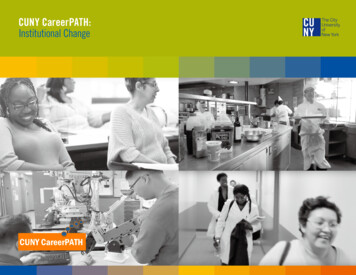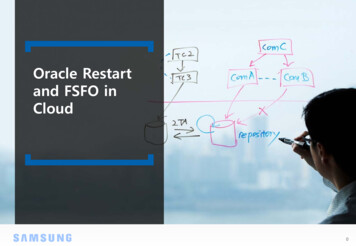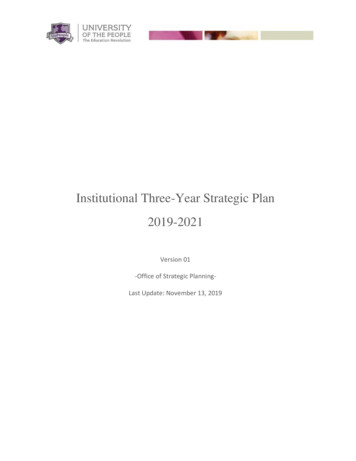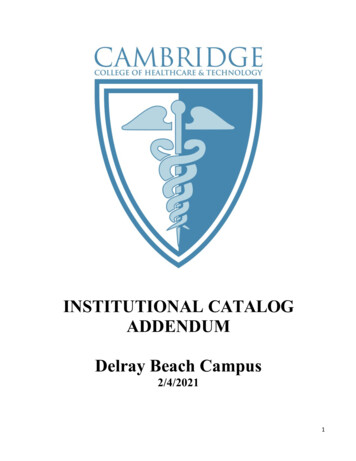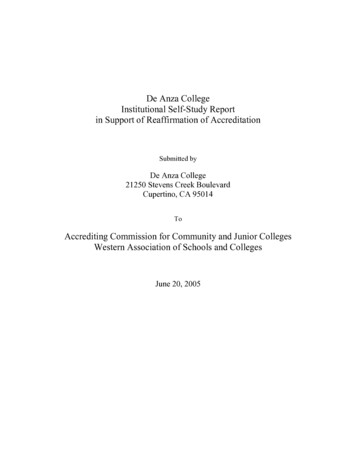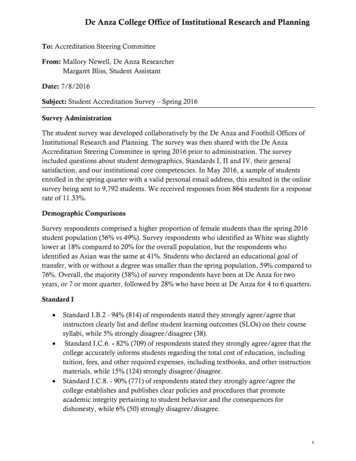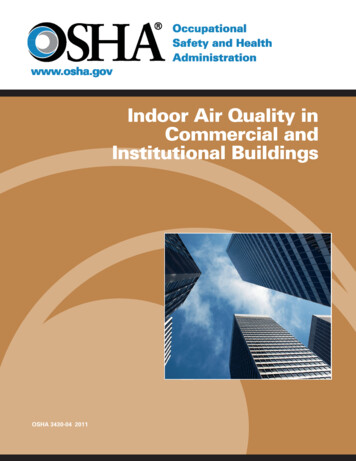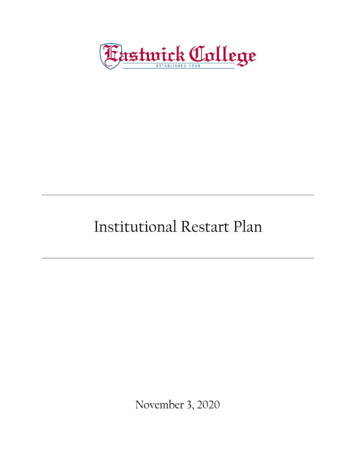
Transcription
Institutional Restart PlanNovember 3, 2020
Institutional Restart PlanNovember 3, 2020PreambleOn June 11, 2020, the Office of the Secretary of Higher Education (OSHE) approved Eastwick College’s (EC) requestfor a waiver from the order to cease in-person instruction in Executive Order 107. The waiver approval allows EC toconduct in-person laboratory activities in the following programs (the letters in parentheses denote the campuseswhere those programs are offered: Ramsey, Hackensack, and Nutley). AAS in Diagnostic Cardiovascular Sonography (RN)AAS in Electronics and Computer Technology (N)AAS in Funeral Service (H)AAS in Health Science (RHN)AAS in Health Science – Health Information Technology Concentration (N)AAS in Nursing (LPN-to-RN Bridge Program) (RH)AAS in Occupational Therapy Assistant (R)AAS in Surgical Technology (R)BS in Diagnostic Cardiovascular Sonography (R)BS in Diagnostic Medical Sonography (R)Licensed Practical Nursing (RH)Bilingual Licensed Practical Nursing (H)Medical Assisting (RHN)Electronics and Computer Technology (N)Heating, Ventilation, Air Conditioning, and Refrigeration Technology (N)The waiver approval also allows Eastwick College to conduct certification testing in the AAS in Surgical Technologyprogram and computerized testing in the Licensed Practical Nursing, Bilingual Licensed Practical Nursing, and AASin Nursing programs.Under this waiver approval, Eastwick College began authorized activities during the week of June 22, 2020. Theimplementation of the activities outlined in the waiver application has been successful.EC’s Restart Plan will include the activities authorized by the waiver, which are currently underway, and additionalactivities to start on July 16, 2020, which will be described in the Instruction section of this document.1. General SafeguardingHow will the institution implement general safeguarding measures during each stage? These safeguards include but are not limited to:oCleaning and sanitization,[Note: EC will refer to cleaning and disinfection, as the latter is meant to destroy or inactivate bacteria and viruses identified on theproduct’s label]EC’s facilities maintenance staff clean and disinfect hard, non-porous surfaces, such as floors, restrooms,desks, and counters daily. Surfaces that are touched frequently during the day, such as handles, push bars,and doors, are cleaned several times during hours of operation. EC uses a product certified by the U.S.Environmental Protection Agency (EPA) for use against SARS-CoV-2, the virus that causes COVID-19.
Cleaning and disinfection of laboratory equipment and workspaces are typically the responsibility of thelaboratory instructors and their students, which is consistent with practices in the workplace. Breaksbetween laboratory sessions were increased to facilitate the preparation of laboratories for subsequentsessions.oRequiring face coverings,EC requires staff, faculty, students, and visitors to wear face masks inside the college’s buildings. Staffmembers who work in individual offices may work without a mask but must put their masks on if somebodyenters their offices.oMaintaining adequate supplies, such as personal protective equipment and cleaning supplies,EC facilities maintenance staff, in coordination with campus directors and deans, maintain an inventory ofcleaning supplies that exceeds the needs of the institution. There are functional handwashing stations in therestrooms as well as in the medical, nursing, funeral service, culinary, occupational therapy, and surgicaltechnology laboratories. All handwashing stations have foam soap and paper towel dispensers. Therestrooms have touchless paper towel dispensers. Rooms without handwashing stations are equipped witha station including an alcohol-based sanitizer near the entrance. All stations are equipped with tissuedispensers and touchless trash cans.Academic deans and program directors maintain an inventory of personal protective equipment (PPE) thatexceeds the needs of faculty and students for scheduled activities. EC purchased cloth masks for faculty,staff, and students who want to use them or as a replacement, should they forget to bring or damage theirown.oRequiring individuals to engage in social distancing practices at all times, andEC staff, faculty, and students are required to practice social distancing (6 ft.) while on campus. There areexceptions to this rule during laboratory practices that require students to work on each other (e.g., takingvital signs or performing ultrasound scanning). In those instances, laboratory instructors enforce additionalmeasures, such as wearing gowns and face shields. Posters throughout the campus remind students tomaintain social distancing. Faculty and administrators remind students to maintain social distance as theymonitor scheduled activities or students walk common areas on their way to laboratory sessions or out ofthe building.oTraining students, staff, and faculty regarding COVID-19 sanitization and social distancing practices and protocols.There are posters at the main entrance to EC’s campuses and in hallways and laboratories that includeinformation on COVID-19 prevention and a QR code to the CDC’s COVID-19 webpage. Measures to preventthe transmission of the virus that causes COVID-19 are reviewed during the first scheduled laboratory ortesting session and reinforced afterward.Most EC programs are in healthcare areas and all academic deans have healthcare backgrounds. This createsan environment with heightened awareness about the characteristics of COVID-19 and the measures toprevent it. Faculty and students in other programs benefit from the experience and knowledge of their peersin healthcare programs to learn and practice the protocols required to prevent the transmission of COVID19.2. Screening, Testing, and Contact Tracing ProtocolsPlease describe the planned testing and tracing protocol for the institution, including details regarding how you plan to collaboratewith your state/local health department for contact tracing and notification of positive tests or viral outbreaks either on campus oramong the campus community.2
What screening measures will be in place? How will you communicate these screening protocols to stakeholders?EC hired graduates from its healthcare programs as health screeners (HS) to work at the entrance of all ECcampuses. The HS document screening of faculty staff, students, and visitors (hereinafter persons) enteringthe facility on a log. The screening consists of taking the person’s temperature with a touchless thermometerand asking for the recent onset of COVID-19-related signs and symptoms (fever, cough, sore throat,shortness of breath). Persons who respond affirmatively to any of those signs and symptoms are sent homeand a notation is made on the log for future tracing. If the person entering the facility is a student, theprogram of study is recorded.The screening protocol was communicated to all EC stakeholders via email using the Blackboard platform. What will be the testing protocol?Because EC is a commuting institution and the screening measures in place do not allow the entry of personswith COVID-19-related signs and symptoms, there is no plan to conduct testing at the college.Persons who upon screening are denied entry to the college and persons who call the college to reportCOVID-19-related signs and symptoms that arose while away from school are advised to see their healthcareproviders to determine if testing for the virus that causes COVID-19 is necessary. In both cases, persons willbe required to quarantine for 14 days and submit medical documentation indicating that they can return toperforming scheduled activities at the college. Both situations will trigger contact tracing coordinated bycampus academic deans. All contacts will be notified following HIPAA guidelines and will be required toquarantine for 14 days. How will the institution house or transport exposed or ill residential students and plan for timely reporting, while maintainingconfidentiality?This section does not apply. EC is a commuting institution. How will the institution log students, faculty, staff, and visitors to help facilitate contact tracing?Students and visitors (e.g., prospective students) may enter EC facilities only if they have scheduledactivities (e.g., laboratory session, meeting with an admissions or financial aid staff member). The campusentry log described under Screening Measures is a daily registry of all persons who entered Eastwick College.Additional daily attendance logs are maintained in each division (e.g., admissions, financial aid, careerservices, externship) and laboratories where campus activities are scheduled.EC divisions and laboratories maintain additional logs of student attendance, which can be used for contacttracing if a student reports a confirmed COVID-19 diagnosis by a healthcare provider.The use of campus and division/laboratory logs allows EC campus deans to trace contacts precisely.Identified contacts of persons diagnosed with COVID-19 will be advised to monitor potential signs andsymptoms, see their healthcare providers if the symptoms appear or worsen, and complete a 14-dayquarantine.Instances of COVID-19 will be reported for EC Ramsey to the Mid-Bergen Regional Health Commission, forEC Hackensack to the Hackensack Department of Health, and for EC Nutley to the Montclair HealthDepartment.3
For the following categories, please address the institution’s plans in all applicable Stages.Before addressing the questions below, it is important to reiterate that EC is currently operating under the waiverapproval described in the Preamble section of this document. Approved activities include in-person laboratoryinstruction with classes limited to a maximum of 10 students, computerized certification testing in the AAS inSurgical Technology, and computerized testing in EC’s nursing programs. All lecture courses are being deliveredremotely via Zoom. This situates EC’s activities in Stage 2 of the OSHE Restart Standards for all New Jersey Institutions ofHigher Education.EC plans to continue remote delivery of lecture classes through December 31, 2020, as authorized by EC’s institutionalaccreditors.Campus-based activities not included in the waiver, which EC plans to resume on July 16, 2020, include: Testing in all EC programs. This will be limited to high-stakes testing, such as mid-term, final, andcertification exams at the discretion of the faculty and in coordination with program directors, academicdeans, and registrars. Faculty will continue using alternative assessment methods and testing via onlineplatforms when possible. Laboratory activities in the AAS in Culinary Arts (Hackensack campus), which were not covered by thewaiver. Externship/fieldwork/clinical activities: Students who attend these off-campus activities must meet therequirements of the affiliated institutions in which the practicum experiences take place, including allmeasures related to COVID-19 prevention. EC processes and procedures ensure that students are aware ofsite-specific policies before placement and monitor student activities periodically through the completionof the off-campus experience. These experiences apply to the following programs. oAAS in Business and EntrepreneurshipoAAS in Culinary ArtsoAAS in Diagnostic Cardiovascular SonographyoAAS in Nursing (LPN-to-RN Bridge Program)oAAS in Occupational Therapy AssistantoAAS in Surgical TechnologyoBS in Diagnostic Cardiovascular SonographyoBS in Diagnostic Medical SonographyoBilingual Licensed Practical NursingoLicensed Practical NursingStudent Services: These activities will be described in the corresponding section.3. Instruction For in-person courses, how will you ensure the institution is complying with the social distancing and other general safeguardingmeasures for classrooms?EC will continue offering in-person laboratory activities under the conditions of the approved waiver. Thereis a maximum of 10 students per laboratory class. Workstations are spaced to meet or exceed the 6-footsocial distancing requirement. Students are always required to wear a face mask. Students will wash handsor use alcohol-based hand sanitizer before and after laboratory sessions. Additional PPE, such as gloves,masks, gowns, and face shields may be used based on the tasks required. Instructors and students will followdiscipline-specific protocols to clean and disinfect workstations and laboratory equipment. An extended4
break between laboratory sessions will allow instructors to ensure proper cleanliness and disinfectionbefore the next scheduled session and request assistance, where applicable, from EC facilities maintenancestaff.November 2, 2020, Update: Eastwick College added in-person lectures for the followingprograms:Nutley Campus:oooAAS in Electronics and Computer TechnologyDiploma in Electronics and Computer TechnologyDiploma in Heating, Ventilation, Air Conditioning, and RefrigerationTechnology.Ramsey CampusoAAS in Surgical TechnologyThese programs have courses that use a combination of lectures and hands-on activities at campuslaboratories. Students are scheduled in small cohorts that follow the social distancing and generalsafeguarding guidelines described elsewhere in this section.Faculty in other programs began teaching lecture courses online via Zoom from their EastwickCollege campuses. This measure was taken to begin a transition toward full implementation ofcampus activities in case the United States Department of Education does not extend thetemporary authorization to deliver courses online beyond December 31, 2020. How will you accommodate faculty and students who are immunocompromised, or at high-risk for COVID-19, or have receiveda positive diagnosis of COVID-19, and are thus unable to attend classes in-person?President Eastwick notified faculty and students that they are not obligated to attend in-person laboratorysessions. When feasible, faculty may use methods to provide laboratory experiences via distance education.Alternatively, other qualified faculty members may provide on-campus temporary coverage. Students whomiss laboratory sessions due to a positive COVID-19 diagnosis may arrange a make-up schedule with theirinstructors or program directors. Finally, students who are unable to meet attendance requirements due toCOVID-19 diagnosis or higher risk of acquiring the disease may request a leave of absence. How will you encourage social distancing through signage and layout of classrooms?Social distancing is encouraged through changes, when necessary, in the layout of laboratories to ensure aminimum of 6 feet between participants. Posters and distance markers remind students and faculty thatthey must maintain that separation. When feasible, unidirectional circulation flows facilitate maintainingsocial distance and efficient movement of participants in a laboratory. How will you ensure high-touch areas and shared surfaces in classrooms are cleaned and sanitized after every use?Faculty are responsible for enforcing that students clean and sanitize their workstations and equipmentafter use, as dictated by professional practices. EC facilities maintenance staff continually clean and sanitizehigh-touch areas, counters, floors, and other surfaces not included in laboratory practice protocols.4. On-Campus Residential HousingThis section is not applicable. EC is a commuting institution.5. Libraries and Computer Labs (other facilities as needed) What is your plan for operation of computer labs and libraries?EC’s computer laboratories will be used for testing as described under the Instruction section. The librarieswill remain closed until OSHE authorizes the implementation of Stage 3 activities. The EC Online Library5
meets the needs of students in all EC programs. The director of library services is available to solve anylibrary-related issues and to support the activities of students and faculty. How will the institution implement social distancing measures and cleaning protocols in these facilities?Students will use every other terminal for their tests or assignments, which ensures appropriate socialdistancing. The cleaning protocol for computer peripherals used by students during laboratory sessions isdescribed under the third bullet below. EC facilities maintenance staff will clean and sanitize the computerlaboratories daily and high-touch surfaces several times a day. How will the institution follow state occupancy restrictions in these facilities and reduce occupancy?With a maximum of ten students per session, computer laboratories will be used at up to a third of theircapacity. How will the institution clean and disinfect high-touch areas in these facilities, such as computer terminals?Students will clean and disinfect keyboards, mice, touchscreens, and the desktop surface immediatelyaround them upon completion of their session. EC facilities staff will clean and disinfect other high-touchareas periodically. Students will be encouraged to use an alcohol-based hand sanitizer upon completion ofthe session or to wash their hands after they leave the computer laboratory. Will the institution utilize curbside pickup for libraries? If so, how will the plan for curbside pickup be implemented?No, EC will not utilize curbside pickup for its libraries.6. ResearchThis section is not applicable.7. Student Services What is the institution’s plan for student services?EC plans to resume student services in the areas of admissions, financial aid, academic advising,externship/fieldwork placement, and career development. How will student service departments reduce in-person interactions and implement safeguarding measures, particularly inwaiting areas?EC prospective students, students, and graduates may visit the admissions, financial aid, academic advising,or career services offices by appointment and only when their physical presence is required. Mostinteractions with student services will continue via email, telephone, or Zoom meeting.EC student services staff will clean and disinfect the chair, desk, and other surfaces that visitors may touch.EC facilities maintenance staff will clean and disinfect other high-touch surfaces periodically. Furniture inoffices and waiting areas will be spaced to ensure a social distance of 6 feet. The offices will be fitted withPlexiglass screens to improve protection. Distance markers and posters will be placed strategically to remindvisitors to maintain social distancing. Visitors must leave the campus upon the completion of the scheduledactivity.There will be hand sanitizing stations near administrative offices where scheduled student services activitiestake place.6
How will students, staff, and faculty who are immunocompromised, or otherwise in an at-risk category, or those with a positivediagnosis, be able to access student services remotely?Persons in at-risk categories or with a positive COVID-19 diagnosis may access student services via email,or telephone. EC student services staff will do their best to meet their needs and supplementcommunications with Zoom meetings, if necessary. If any interactions that require the person’s physicalpresence cannot be completed, then they will be postponed until a time that they consider it safe or thecollege resumes normal activities.8. TransportationThis section is not applicable.9. On-Campus DiningThis section is not applicable.10. Study Abroad and International TravelThis section is not applicable.11. AthleticsThis section is not applicable.12. Other Information/AppendicesThis section is not applicable.7
Nov 03, 2020 · program and computerized testing in the Licensed Practical Nursing, Bilingual Licensed Practical Nursing, and AAS in Nursing programs. Under this waiver approval, Eastwick College began authorized activities during the week of June 22, 2020. The implementation of the activitie

